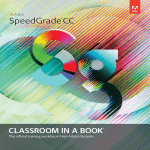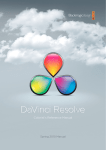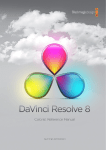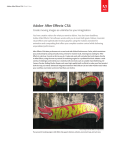Download Adobe Photoshop Elements SpeedGrade CS6, Win, RTL, ENG
Transcript
Introducing Adobe SpeedGrade CS6 Adobe® SpeedGrade™ CS6 Craft the perfect look for every production Bring professional grading into your productions with Adobe SpeedGrade CS6 software and the new Lumetri™ Deep Color Engine. Grading and finishing can dramatically transform the whole mood of any edited piece, and few professional productions are delivered today without a thorough color treatment. Now part of Adobe Creative Suite®, SpeedGrade CS6 opens up the full dynamic range of your footage, giving you the power to push your storytelling further. Sporting a sleek new interface and engineered for modern file-based workflows, SpeedGrade CS6 is a native 64-bit application offering GPU-accelerated performance and broad format support, including RAW, HDR, and stereoscopic content. Work easily with footage from today’s digital cinema cameras, such as ARRI ALEXA and RED or with common post-production interchange formats such as QuickTime, DPX, and OpenEXR. Ensure all your shots are accurately matched and every project is beautifully styled using powerful layer-based tools for color correction and look design. Resize and reframe your final masters for virtually any display format, from handheld tablets to the big screen. SpeedGrade CS6 brings advanced color grading capabilities to Adobe Production Premium, the Creative Suite edition production professionals rely on to get great results efficiently. Offering best-in-class applications for editing, motion design, compositing, and audio, this comprehensive post-production hub now offers professional color grading to a new generation of artists and filmmakers. Source image © 2010-2011 Mattel, Inc. All rights reserved Powered by the new Lumetri Deep Color Engine, Adobe SpeedGrade CS6 provides an entry into modern color grading and look design, expanding the toolset of creative professionals using CS6 Production Premium. Top features •Lumetri Deep Color Engine (Page 3) •Streamlined user experience (Page 3) •Powerful layer-based color grading (Page 5) •GPU-accelerated performance (Page 6 ) •Professionally designed looks, filters, and effects (Page 6) •Adobe workflow integration (Page 6) •Broad file-format support (Page 7) •Making shots match (Page 8) •Award-winning stereoscopic toolset (Page 8) •Grading panel support (Page 9) •Automatic scene detection and Pan and Scan (Page 9) With Adobe SpeedGrade CS6, you can: Master your images with precision. SpeedGrade CS6 enables you to craft the perfect look for every scene with the floating-point accuracy of the GPU-accelerated Lumetri Deep Color Engine. Explore unlimited creative possibilities. Discover the SpeedGrade CS6 color grading toolset through a clean new UI. Apply layers of primary and secondary color adjustments, film-style filters, and effects to give each project the right look and feel. See your shots come to life before your eyes. Manipulate light and color in real time with the responsive performance of SpeedGrade CS6. Refine creative looks and make grading adjustments with commonly used input devices, from a mouse to a professional colorist’s panel. Who can benefit from Adobe SpeedGrade CS6? Editors can expand their skill set and take their productions to a new level with the powerful color correction and look-design capabilities of SpeedGrade CS6. Editors can send projects directly from Adobe Premiere Pro to SpeedGrade CS6, where a refined interface guides users through the color workflow. Users can also open Edit Decision Lists (EDLs) in SpeedGrade CS6 to automatically conform source material or work directly with individual clips. SpeedGrade CS6 helps editors handle everything from matching shots and creating consistent color across scenes to full-fledged professional grading workflows. Motion graphics designers and visual effects artists gain a new level of control and color precision with SpeedGrade CS6. In preproduction, artists and designers can build looks with SpeedGrade CS6 and generate LUTs from these for use in Adobe After Effects and Adobe Photoshop software, establishing visual consistency across their production pipelines. Or they can bring finished content into SpeedGrade CS6 to add polish and impact with a final grading pass. The comprehensive tools and color-centric capabilities of SpeedGrade CS6 allow users to create beautiful finished results with real-time GPU-based grading that processes moving images entirely in 32-bit float. 64-bit computing with 32-bit color processing SpeedGrade CS6 is a native 64-bit application that makes maximum use of today’s multicore computer processors. The Lumetri Deep Color Engine processes images in 32-bit floating point color, enabling SpeedGrade CS6 to de-Bayer RAW footage in real time, work with HDR content, and switch between logarithmic and linear color spaces. Connect SpeedGrade CS6 to a grading panel for direct control and real-time feedback while shaping your look. Professional colorists now have an advanced color grading system within a comprehensive post-production solution: Production Premium CS6. Colorists can collaborate seamlessly with other artists on every project. Users can share SpeedGrade CS6 .Look files with visual effects teams, and output dailies and offline content with .Looks applied. SpeedGrade CS6 can conform EDLs or simply receive completed sequences from Adobe Premiere Pro. SpeedGrade CS6 supports many standard grading panels, providing colorists with tactile control of their colors. Support for leading digital cinematography and post-production file-formats, as well as advanced stereoscopic capabilities, allow colorists to deliver their creative vision on a full range of projects. Introducing Adobe SpeedGrade CS6 2 Top features of Adobe SpeedGrade CS6 Lumetri Deep Color Engine Color correction vs. look design Color correction is about making sure all your shots are consistent and look their best. Look design is about establishing the feel of a place, time, or emotional state. The Lumetri Deep Color Engine is the 32-bit floating-point image-processing technology at the heart of SpeedGrade CS6. The Lumetri Deep Color Engine offers maximum scope for working with High Dynamic Range content, allowing you to pull details from blacks and highlights that might otherwise be lost. Along with standard post-production formats, the SpeedGrade CS6 Lumetri Deep Color Engine allows you to work directly with RAW files, the digital negative recorded from your camera sensor. As with digital still photography, RAW formats provide you with the greatest latitude as you craft your looks, whereas most other grading tools require you to render RAW files into an RGB format for post-production work. In addition, the Lumetri Deep Color Engine supports both linear and logarithmic color spaces, giving you the flexibility to work with a variety of source material. The Lumetri Deep Color Engine works nondestructively, so you can revisit color decisions at any point in your grading workflow and make changes without compromising the integrity of your source material. SpeedGrade CS6 provides real-time feedback as you develop your creative look. Use multiple playheads to compare shots or different looks. The interactive timeline shows your clips, transitions, grades, masks, and EDLs. Color adjustments and grading layers are displayed in the Look panel. Apply professionally designed grading presets included with SpeedGrade CS6, or effects such as sharpen or glow, and retain full control of the settings in each. With the Lumetri Deep Color Engine you can combine and refine .Looks, effects, and new grading layers without having to “bake in” any of your color decisions until final rendering. Introducing Adobe SpeedGrade CS6 3 Streamlined user experience Discover the colorist’s craft through the innovative SpeedGrade CS6 interface, which guides you through the process of grading your projects. SpeedGrade CS6 opens in Desktop view, where you locate clips or EDLs to add to the timeline. The Desktop provides powerful search and filter tools for assembling your assets, and you can set up multiple Desktops to manage different projects. Once your clips are on the Timeline, toggle to hide the Desktop and see your footage in the Monitor. Locate clips, completed sequences, or EDLs on the Desktop. Add items to the timeline by double-clicking their thumbnails. With your content loaded, click on the Look tab to apply primaries and secondaries, along with film-style filters and effects—and shape light and color with accuracy and artistry. Apply color adjustments to the overall image, shadows, midtones, and highlights using the Look panel. Design and refine looks by layering multiple primaries, secondaries, and effects. What is a .Look file? SpeedGrade CS6 saves grades, including primaries and secondaries, masks, effects, and settings for each layer as a .Look file. You can save, copy, reuse and modify .Look files for different shots and projects. Parts of the .Look file can also be exported as LUTs for use with other tools. A typical workflow begins with basic color correction tasks, such as balancing blacks and whites and adjusting the gamma. This can be done with a single primary color correction layer or you can add new layers for more granular control. You might make overall adjustments on the first primary layer, add another layer for shadow, midtone, and highlight adjustments, and use additional layers for secondaries. Once your shots are color-balanced and you’ve started matching your shots, you can move on to crafting a more nuanced creative look, which you can apply scene-by-scene. Look design communicates the mood of the story and gives your work its distinctive visual signature. Build sophisticated looks as layers, each with its own controls and opacity. Looks are stored in the .Look browser. The SpeedGrade CS6 interface organizes color grading tasks logically, so you can work efficiently, but is also flexible, so you can move around within your workflow as you shape your looks. Introducing Adobe SpeedGrade CS6 4 Powerful layer-based color grading Primaries and secondaries Primary color corrections are applied to the whole image—for example, to change the cast of a scene or a whole film. Secondary color corrections are adjustments to specific color ranges. SpeedGrade CS6 allows you to define a very narrow color range for a secondary, for example, to emphasize a specific element in the image, for example skin tones. You can also use broader secondary color ranges, such as when you want to showcase the rich greens in a forest or the beautiful red shades of a sunset. With SpeedGrade CS6, color corrections, masks, and filters are applied as layers, making it easy to use simple elements to build up and make adjustments to complex grades. You can add, remove, combine, and rearrange grades and effects, and adjust the influence of each layer with its own opacity slider. In one scene, you might apply a soft bleach bypass for a desaturated, high-contrast effect along with a subtle blue cast for the whole frame, and then add a mask with a warmer tone around your subject to highlight a character. You can apply secondary grades to color ranges within the frame to draw the eye to important elements within the frame or to blend parts of the image into their surroundings. Save grades as .Look files, including all layers and settings, so it can be reused and modified for different shots or projects. Apply primary color corrections to the whole frame in combination with effects and secondary grades for selected color ranges. Grading tracks on the Timeline provide another way to apply .Looks, or grading elements such as masks or grading transitions. This is a great way to create visual continuity across scenes or whole projects in tandem with the clip-specific color corrections. Masks are part of the layer structure and can be positioned as easily as any other layer, so that color corrections are applied to the areas inside, or outside, your mask. In SpeedGrade CS6, mask feathering allows for infinite falloff: You can determine with precision how one area of the image flows into the other, or apply vignettes to the whole frame that are as bold, or as subtle, as the story requires. Create and modify mask shapes with intuitive drawing tools and the interactive mask widget. You can track and animate masks and control feathering with precision. Layer-based color grading is where SpeedGrade shows its power—and where your storytelling comes alive. Apply as many corrections and effects as you need to get the shot right. All adjustments are automatically combined in the Lumetri Deep Color Engine and processed as a single operation, for optimum performance, even with complex grades. Introducing Adobe SpeedGrade CS6 5 GPU-accelerated performance The 64-bit Lumetri Deep Color Engine in SpeedGrade CS6 harnesses the processing power of the GPU for optimum graphics performance. The result is real-time feedback while you grade your footage, regardless of resolution or frame size. Resize and reframe your shots, and pan and scan, all in real time, to create perfectly composed images for virtually any display format. To maintain real-time performance SpeedGrade CS6 requires an Adobe-certified graphics card with 1GB of VRAM, such as an NVIDIA Quadro 4000, 5000, or 6000 graphics card. For the most up-to-date system specifications information, visit www.adobe.com/go/speedgrade_systemreqs. Professionally designed looks, filters, and effects SpeedGrade CS6 includes a selection of professionally designed .Looks, film-style filters, and effects, a great addition to the application’s powerful color adjustment tools. Exporting .Looks as LUTs SpeedGrade CS6 .Look files can be exported as LUTs for use in other applications. However, LUTs do not include masks, or effects such as blur or glow. If you are creating .Look files for other applications, use primary and secondary corrections. Use the other functions for your creative work in SpeedGrade CS6. The .Look presets in SpeedGrade CS6 provide a fast entry into the world of advanced color grading. When you apply a preset to a shot, or a whole project, all of the layers are displayed in the layer stack. This means you can see exactly how the .Look was created, and fine-tune it for your project. • Film-style filters in SpeedGrade CS6 are emulations of chemical processes traditionally used in developing film stock. These include bleach bypass, day-for-night, Technicolor 2-strip, and Technicolor 3-strip. • Effects allow you to modify the appearance of footage. SpeedGrade CS6 includes effects such as sharpen, blur, glow, and others. • LUTs can be used for technical purposes, such as display calibration or color space conversions. You can also use LUTs for creative purposes, such as emulating film stocks. Add effects directly to your layer stack in Putting the pieces together—Filters, effects, and LUTs can be combined SpeedGrade CS6. with primary and secondary corrections and masks to create .Looks. And because .Looks can be applied to a clip or as grading tracks on the Timeline, you have incredible control over how you build and craft each grade. Effects, such as bleach bypass shown here, allow you to build distinctively styled looks for your projects. Introducing Adobe SpeedGrade CS6 6 Adobe workflow integration Now included with Creative Suite 6 Production Premium, SpeedGrade CS6 extends your capabilities with workflows that embrace Adobe Premiere Pro CS6 editing software, as well as Adobe After Effects for visual effects and motion design and Adobe Photoshop for advanced image editing. Adobe Premiere Pro—Once you have completed your edits and are at picture lock, choose File > Send To Adobe SpeedGrade. This command renders each clip in the Premiere Pro sequence as a 10-bit DPX sequence, creates a SpeedGrade .ircp file that includes a timeline, and opens the project in SpeedGrade CS6. You’re ready for grading and finishing. The Send To Adobe SpeedGrade command in Adobe Premiere Pro makes it easy to bring completed projects into SpeedGrade CS6. Source image © 2010-2011 Mattel, Inc. All rights reserved With very large files, you can use SpeedGrade CS6 to open source material and create proxy media for offline editing in Adobe Premiere Pro. In those cases, once editing is complete, use your EDLs to conform the source footage in SpeedGrade CS6. This approach also allows you to swap in newer versions of clips as they are updated and can be invaluable for complex post-production workflows. After Effects and Photoshop—SpeedGrade CS6 .Look files can be applied as LUTs in Adobe After Effects and Photoshop. This means you can work with footage or still frames with your color corrections and creative looks applied. Broad file-format support Moving to digital production workflows often means dealing with a variety of different file types. SpeedGrade CS6 supports commonly used post-production file-formats such as DPX, QuickTime, Targa, TIFF, and OpenEXR, and RAW formats, including ALEXA, RED, Phantom, and Weisscam. Use the rendering engine in SpeedGrade CS6 to quickly generate dailies for review, including automatic calibration, as well as delivering final masters of your projects. You can also use SpeedGrade CS6 to output offline proxy media for editing. For other formats, including broadcast formats such as XDCAM and AVCHD, you can use Adobe Premiere Pro to open your project. From there, you can send your completed sequences to SpeedGrade CS6. Introducing Adobe SpeedGrade CS6 7 Create dailies—SpeedGrade CS6 includes robust built-in support for camera and file metadata so you can quickly and efficiently generate dailies during production work for review sessions with your team or your client. Because you can easily apply .Looks to your dailies, everyone on the project can see the creative intention earlier in the process. Making shots match In a modern production environment, you need to be able to match footage from different sources, as well as correct gamma irregularities and color shifts. You’ll find these tasks easy to accomplish in SpeedGrade CS6, which provides automatic color calibration for QuickTime output, so that offlines and dailies match your source material. Additionally, SpeedGrade CS6 can match color spaces for footage captured with different cameras by automatically matching test shots of Macbeth color charts. SpeedGrade CS6 automates shot matching from different digital cinema cameras such as ALEXA and RED, and DSLR cameras such as the Canon Mark II. Since each of these capture data in a slightly different way, test shots of Macbeth color charts (left) allow you to match color spaces automatically, saving time and guesswork. Award-winning stereoscopic toolset 3D depth budget The “depth budget” refers to the comfortable viewing depth for objects within stereo 3D space. In order to allow the eye to adjust from one shot to the next, changes in the overall depth budget should be gradual. When new types of projects come along, it’s good to know that you have the right gear for the job. SpeedGrade CS6 includes powerful tools for working with stereoscopic content. You can adjust the depth budget placement within your frames to smooth transitions between shots. Floating windows provide a flexible tool for dealing with edge violations to help you create a great viewing experience for your audiences. With SpeedGrade CS6, your grading and effects are automatically applied to both eyes, so you have the creative freedom to focus on the look of your production. Adjust geometry and view stereoscopic content in a variety of ways with SpeedGrade CS6 Introducing Adobe SpeedGrade CS6 8 Other SpeedGrade CS6 features can save you valuable time on stereoscopic projects: Easily load stereo 3D frame sequences—SpeedGrade CS6 automatically loads paired stereo sequences and flips or flops mirrored material. Multiple viewing options—Play right eye and left eye side by side with frame numbers and timecodes to quickly correct temporal offsets. You can also use a split-screen view for comparisons, or a difference matte to spot discrepancies. Automatic geometric and colorimetric correction—SpeedGrade CS6 detects and corrects geometrical misalignments in your stereoscopic footage and automatically matches colorimetry between the right eye and left eye for pristine stereoscopic color. Display support—Play stereoscopic footage on single displays or virtually any dual display setups, including active shutter glasses, passive line-by-line polarization systems, and theater systems. Grading panel support SpeedGrade CS6 offers the advanced tools and capabilities that professional colorists require from a color correction system. The software includes built-in support for a wide range of input devices. From simple trackballs to full professional grading panels such as the Tangent Wave and the Tangent CP-200 series, SpeedGrade CS6 makes it easy to bring tactile control to your grading workflow. Automatic scene detection and Pan and Scan SpeedGrade CS6 can automatically identify edits from archived projects. This allows you to distinguish individual cuts, which can save a lot of time on restoration and remastering projects. Automatic scene detection helps speed up work on projects, such as archived material. Source images © 2010-2011 Mattel, Inc. All rights reserved Pan and scan tools allow you to reframe content for virtually any deliverable format. To use this feature, add a pan and scan track to your timeline. You can then interactively reframe and resize your content, including keyframes to animate transitions from one framing decision to the next one. You might use pan and scan, for example, when the camera is moving out from a close-up. You could reframe the wider image so that it looks balanced, or to make sure that certain image elements are still included. About Adobe Systems Incorporated Adobe is changing the world through digital experiences. For more information, visit www.adobe.com. Introducing Adobe SpeedGrade CS6 9 System requirements Mac OS Windows •Multicore Intel® processor with 64-bit support •Intel® Core™ i7 processor with 64-bit support •Mac OS X v10.6.8 or v10.7 •Microsoft® Windows® 7 with Service Pack 1 (64 bit) •4GB of RAM (8GB recommended) •4GB of RAM (8GB recommended) •1GB of available hard-disk space for installation •1GB of available hard-disk space for installation •1680x1050 display required; 1920x1080 display and second professionally calibrated viewing display recommended •1680x1050 display required; 1920x1080 display and second professionally calibrated viewing display recommended •OpenGL 2.0–capable system •OpenGL 2.0–capable system •Adobe-certified GPU card with at least 1GB of VRAM recommended; visit www.adobe.com/go/speedgrade_systemreqs for the latest list of supported cards •Adobe-certified GPU card with at least 1GB of VRAM recommended; visit www.adobe.com/go/speedgrade_systemreqs for the latest list of supported cards •DVD-ROM drive for installation from DVD media •DVD-ROM drive for installation from DVD media •QuickTime 7.6.6 software required for QuickTime features •QuickTime 7.6.6 software required for QuickTime features •Optional: Tangent CP200 family or Tangent Wave control surface •Optional: Tangent CP200 family or Tangent Wave control surface •This software will not operate without activation. Broadband Internet connection and registration are required for software activation, validation of subscriptions, and access to online services.* Phone activation is not available. •Optional: For SDI output, NVIDIA Quadro SDI Output card required For updates to system requirements and more detailed information about video hardware compatibility, visit www.adobe.com/go/speedgrade_systemreqs. •This software will not operate without activation. Broadband Internet connection and registration are required for software activation, validation of subscriptions, and access to online services.* Phone activation is not available. For updates to system requirements and more detailed information about video hardware compatibility, visit www.adobe.com/go/speedgrade_systemreqs. Expected release date Second quarter 2012 For more information Product details: www.adobe.com/speedgrade Adobe Systems Incorporated 345 Park Avenue San Jose, CA 95110-2704 USA www.adobe.com Adobe, the Adobe logo, Adobe Premiere, After Effects, Audition, Creative Cloud, the Creative Cloud logo, Creative Suite, Encore, Muse, Photoshop, Prelude, and SpeedGrade are either registered trademarks or trademarks of Adobe Systems Incorporated in the United States and/or other countries. Mac OS is a trademark of Apple Inc., registered in the United States and other countries. QuickTime is a trademark used under license. Intel is a trademark of Intel Corporation or its subsidiaries in the United States and other countries. Microsoft and Windows are either registered trademarks or trademarks of Microsoft Corporation in the United States and/or other countries. All other trademarks are the property of their respective owners. © 2012 Adobe Systems Incorporated. All rights reserved.



















